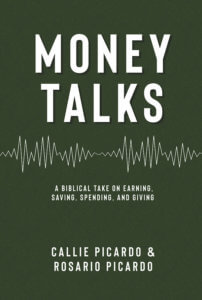How does our faith influence our relationship with money? Jessica Anschutz of the Lewis Center staff speaks with Callie Picardo, a teacher and the coauthor of Money Talks: A Biblical Take on Earning, Saving, Spending, and Giving, about stewardship, gratitude, and how creative partnerships can expand ministries.
Listen to this interview, watch the interview video on YouTube, or continue reading.
Jessica Anschutz: Callie, in the introduction to Money Talks, you ask how does the subject of money and scripture apply to our everyday lives?
Callie Picardo: I love the fact that God loves us from before we were born to our afterlife, while caring about our life here and now on earth, including our finances. They are over 2,300 verses in scripture on money, possessions, how we earn our finances, how we save, and how we give and spend. God loves us so much that this is very much a part of scripture, and a significant part of Jesus’s teaching throughout the parables and the teachings he passes on to the disciples.
Jessica Anschutz: There is a treasure trove of resources in the Bible when it comes to our use of money. How are we as Christians called to be countercultural when it comes to the pursuit of money?
Callie Picardo: We’re called to be countercultural in so many areas. But this is one of those areas that often Christians look like the rest of the world if we’re not careful. Paying down debt often looks as much like the world’s way as it does God’s way. The heart is the key in the financial piece. God doesn’t really need our money, but God wants our heart, and because the two can be so easily linked, I think that’s the big part. It starts with: where is your heart in this?
For instance, it’s good to save. That’s a general world principle that most people would agree on. But if we get to the point where money becomes our idol, then in that place of our heart, money has taken a seat above God. I’ve heard the question, “What gives you more fear: if I told you God is not real or if I told you there’s no money in your bank account?” If someone told me, “Your bank account is empty,” I would start freaking out. If they said, “God’s not real,” I’d have to do some soul-searching, but “no money in your bank account” gives me a heightened sense of panic.
So, doing it from God’s way, where the heart is not about hoarding but you’re also diligently saving — it’s not a prosperity gospel, because I’ve seen some Christians go that way. “Well, if you give to my XYZ ministry God’s going to bless you with a Mercedes Benz because all Christians should be driving fancy cars and living a high lifestyle.” That’s not in the Bible. There are people who have wealth, but I’ve also heard others say if you’re following God, you should give it all the way to the poor. God does call some people to do that. That is a possible call on your heart. But there are people that have wealth and use it for the kingdom in scripture. So, have the right heart perspective and let God lead you.
Jessica Anschutz: I appreciate having the heart in the right place and focusing on the right things. In the world today, especially in the United States, a lot of the congregations are really struggling financially. What words of wisdom do you have for church leaders amid the struggle, so that they can avoid chasing, idolizing, or hoarding money?
Callie Picardo: When you take a lot of the things that apply to individuals a step further, they apply to the church. It goes back to the heart of the leaders. I am a firm believer that you can’t take someone somewhere you haven’t been yourself. If leaders are wise with their own finances and have their hearts right with God, that helps them lead the Church in those ways. If funding is tight, the temptation is to turn to a scarcity mindset.
We forget God is the God of abundance. God loves us. God loves the Church. God chose the Church in all our brokenness to be God’s vessel for taking the gospel to the world, and so diligently stewarding those resources in a faithful way rather than the world’s way is key. Seek God first in prayer. It’s that quote, you know — work as if it all depends on you but pray as if it all depends on God! So, take it to prayer first but then let God lead us as we put in place the financial principles. Let’s get the budget in order. If more is going out than coming in, that needs to stop. Then start saving money — a little bit of an emergency fund — but also making sure you’re being generous because the church has a tendency to say, “Okay, we’ve got to focus on keeping the light bill paid and the salaries paid.” Then they cut out all the money for ministry.
If your church is struggling financially, go out with a bang. If your church is going to close in a few years, you might as well spend it all on ministry. And if you’re going to close, hopefully some more people know Jesus in the meantime. But what might also happen is that people start knowing Jesus and start coming, and then God starts moving. So, it’s having that tension of “I’ve got to be a wise steward” but not only trusting our own wisdom but also leaning into God. Still being generous, putting in practice those wise financial steps, but also encouraging generosity.
I have seen so many churches waste the time of offering and say, “Okay, now the ushers are going to come forward.” Tell them what God is doing and what is going to be the impact of your giving. It’s a perfect opportunity to say thank you to those who are giving and to say, “Because of your giving, here is what is happening. God is moving, and here are the ways how to be able to share,” because no one wants to give to a sinking ship. When you say, “If you don’t give, we’re going to have to close the doors,” then, if the church is closing, I need to find another church. But if you’re saying, “Here’s the ministry that’s happening. Here’s the opportunity,” then I want to be a part of that. There are some creative things churches can do through partnerships and building relationships where funding is tight. But it really starts with that heart for God.
Jessica Anschutz: What a powerful reminder to invite people to join us in the mission, ministry, and work that God is doing not only in our church but in our communities through our congregations! In Money Talks, you note the anxiety that comes around money, and you shared some of the anxiety of the thought that there’s no money in our bank account. How can church leaders address this anxiety and lead others to be less anxious?
Callie Picardo: I think it starts with the leader yourself. I do a lot of prayers of surrender in my life, and God was reminding me yesterday in church, “Callie, if you trust me with your eternity, you can trust me with today.” All right, God, I trust that you’re big enough to handle my eternity, my afterlife, but why can’t I trust you today? I keep a journal so often I will write down, “Okay God, I surrender to you.” And I start writing it out.
Another powerful practice that one of my mentors taught me is to have your hands open in front of you and to imagine everything that’s in your mind and visualize it coming out of your brain and into your hands, and then imagine God’s huge hands are underneath yours, and then slowly turn your hands over and place all those things into God’s hands. That is a practice that I do many times a day, because often I try to take those things back from God’s hands and put them into my hands and start worrying about them. Anytime I notice myself getting anxious, that is my cue that I’m dealing with something that I need to surrender to God again.
God has given us our emotions for a reason. They are a gift. But if we let our emotions lead us, it’s not going to end well. They are really for me more of a trigger to say, “Okay, why am I anxious right now? What do I need to surrender to God?” By starting to name those things and surrender them to God — whether they’re financial, whether they’re work, whether they’re family, whether they’re the people we are caring for and shepherding — putting them all into God’s hands helps us take on that peace that surpasses all understanding that God promises to us through the power of the Holy Spirit.
Jessica Anschutz: The importance of placing our trust in God and surrendering to God’s leading in our lives is a powerful reminder. We must remind ourselves not only of that once a day but oftentimes many times a day. Given the scarcity mentality, the fear that comes with such a mentality, the worry around not having enough and holding onto our resources and saving them for a rainy day when today might be that rainy day, how can we help church leaders move from the mindset of scarcity to one of abundance?
Callie Picardo: We must turn our attention to what we do have. That practice of surrender is so powerful, but so is the practice of gratitude and giving thanks. One of the quickest ways I can move from a scarcity to an abundance mindset is to list God’s blessings. If you’re thinking, ‘I’ve got a building. It might be that the building needs a new roof, but God blessed us with a building. We have heat today. It might have gone out yesterday, but it’s back on today. Praise the Lord, we have heat!” Whatever it might be, listing what you do have can shift you from a scarcity mentality to an abundance mindset. It might be that you don’t have as much money in the bank account as you wish; but thank God for what you have.
I love the story of Jesus taking the five loaves and two fish. He breaks it, blesses it, and gives it to the disciples who then distribute it and there are basketfuls of leftovers. When we practice communion — on the night that Jesus was betrayed, he took the loaf of bread, he blessed it, broke it, and gave it to His disciples — God is given to us. Even when we feel like we don’t have a lot, just a couple of loaves of bread and a few fish, by giving them to God and saying, “Okay, God, here’s what we’ve got. What do you want to do with it?” God can do miracles, so we trust God who does miracles. We also have the power of the Holy Spirit when we accept Christ, so we are not working in our own strength. We have the power of God within us — God who can do things in ways unseen that make no sense.
It is truly shifting and saying, “What do we have? God, what do you want to do with it?” My husband was the pastor of a downtown urban church he started in Lexington, Kentucky. Typically at churches, when more people come, it means more money. When we had more people come, it meant there were more expenses; they were typically people who financially could not give. We were growing, but we were not growing with those who could give.
God had blessed us with a building, and it was right across the street from an elementary school. We wanted to do outreach with the elementary school, but we didn’t have the financial resources to do it, so we said “God, what are we going to do?” And the Lord provided a nonprofit that wanted to do an afterschool tutoring program. We said, “Great, we have a basement full of classrooms that were once filled that no longer get used on Sundays or throughout the week,” so they took over the downstairs. They remodeled it with their resources and started an afterschool program.
There was a music group that wanted to offer afterschool music classes, so we said, “Great, we’ve got an upstairs that is full of empty classrooms. Would you like it?” So, they remodeled that space with their money, but we’re able for free to use that space to reach out. Then we had another church across town, not even the same denomination. We were United Methodists, and they were Baptists. They said, “We want to reach out to our community. We know folks are not going to come to our church out in the wealthy suburbs, but we want to connect them to Christ. Could we do outreach through your church and connect them to your church?” And we said, “Oh, Hallelujah! Yes, because we don’t have the resources, but we want people to know Christ.”
It is amazing what can happen when we say, okay, here’s what we’ve got. We’ve got a space that’s in a good location for outreach and ministry. Who are the partners out there who we could work together as the body of Christ? We don’t have to all do our own thing. We don’t have to start our own ministries. Who is out there that God wants to connect, so that together we can be the body of Christ to the world around us.
Jessica Anschutz: What a powerful witness to the work that we can do when we work together rather than in our isolated silos. In Money Talks, you write quite a bit about gratitude. How can the practice of gratitude transform our relationship to money?
Callie Picardo: It is easy to pay attention to what we don’t have, and especially when we’re looking at the news, celebrities, social media — I mean, everyone there is always going to be someone that has more than we do. And we’ve got the advertising industry that is designed to make you feel like you don’t have enough because, if you felt like you had everything you need, you wouldn’t buy their product. We have millions of ads coming our way every day that are saying “you need what we are selling,” and it makes us feel like we are not enough. But God has said, “My grace is sufficient for you, for my power is made perfect in weakness.” So, when I feel “not enough,” I go back to 2 Corinthians and remind myself, “Okay, God, I might not feel enough, but God, you are more than enough.” And so, by shifting the mentality to one of gratitude, it starts to change the atmosphere.
I have young kids, and I learn a lot about God through my kids because so often the things I’m trying to teach them I realize I still need to learn myself. I learn from teaching, by trying to teach my kids, and perhaps you learn by teaching your congregation or others that you’re discipling. But I often have kids that for some reason just start whining and grumbling. I know no one else has dealt with that with kids before, but mine for some reason get in this mindset of, “How come she has this? Or why did she get that?” I’ve got three girls, and so they’re always looking at what the other has. If I can catch it early enough before we’re not in full meltdown mode, I can start to say, “Okay, what’s one thing that you’re grateful for that you do have.”
I think the same goes for us that when we start acting like whiny little toddlers. We can stop and name a couple of things that we are grateful for today. And it truly shifts the perspective from one of that scarcity mentality to the abundance mindset because once we’ve named five, we start to keep going and we’re, like, “Oh! Ten. Twenty. I’ve got more than enough. God, thank you!”
Jessica Anschutz: What a powerful reminder that we begin learning these lessons as young people and we continue to grow in our understanding of gratitude as we age. In Money Talks, you write about learning about the use of money and the practice of tithing as a young child. Often in churches, when we think about tithing, we don’t teach about it. We think more about practicing tithing. So how can we teach children to tithe? And what words of wisdom do you have for adults who aren’t yet tithers?
Callie Picardo: It’s something we shy away from because it can feel rigid, but it’s a good discipline. The spiritual disciplines are about putting some practices into place that you do regularly. Then, by doing them consistently over time, you start to see the spiritual growth.
I am a huge fan of tithing because it is setting aside a percent. If God increases your income, you’re able to give more. If it’s decreased, then you’re still giving that percent and saying that first, before I spend any money, I’m setting aside my first fruits for you, God; you are my priority. If you want to grow your faith, if you want to grow your trust in God, try practicing tithing. I mean it will grow your faith because you’ll say, “God, I don’t know how I’m going to do it, but here you go. I’m putting you first.” And then it’s amazing to watch how the rest stretches.
This is the practice that my parents taught me when I was a young kid. It helps the younger you start teaching people because then, as income grows, it’s not a hard thing. People often think that when I have more money, I’ll give. But when you have more money, it becomes harder to part with. When you start when you don’t have a lot, it can grow. When my brother and I started to get an allowance, my parents would always break out the last dollar, so that we had exactly enough to give 10 percent to church. If our allowance was three dollars, we had 30 cents, no excuses; it was there to put in the offering plate at church. Often it ended up in the basket near the donuts at church, but it was still going to God. I think that counts. When I got older and started babysitting, I was tithing; and when I got older and had my first job out of college, I thought, oh, this is amazing! I have so much more I can give because 10 percent on an actual salary versus some periodic income and summer jobs — that is a lot more. Once you get that practice, it becomes exciting because you’re able to give a bigger check.
Now, if you have not ever tithed before, I’d say try it. If it’s like, “Gosh, I don’t know. I can’t do that,” start somewhere and do that percentage giving because it is a way of saying, okay, if my income goes up, I’m able to give more. If it goes down, I give less, but set aside a percentage. If you can’t do 10 percent, what does it look like to start with three or four or five percent? And then each year increase it one percent. I’ve got a friend from church who started doing this. She’s a single mom who has fostered and adopted multiple kids. She’s got five in her household right now, and she started at about three or four percent, and each year she increased it to the point where she was giving more than 10 percent. And to those who may have been giving 10 percent for years, seek God and ask, “God, is this a season where maybe I can bump it up to 11 percent or 12 percent?” Or see what it might look like to do some giving above and beyond that.
I’m a big believer the first fruits go to the church, because that is your body of Christ, your way of being Christ’s presence in the world. Then, if you’re able to go above and beyond to support other amazing causes in your community that is exciting. Then, you can give in alignment with your passion there as well. So, start somewhere. Don’t say, I can’t do 10 percent so I’m not doing anything. Pick a percentage and then adjust it based on your income. Do it as your first giving and automate it. I’ve gotten into bad habits at times when our income is fluctuating so I’ll give a little bit here and there. Then life gets busy, and I forget. So, even if your income fluctuates, have some automatically set aside (I know a lot of people don’t carry checks, so doing automatic online giving) to make giving a priority.
Jessica Anschutz: What helpful tips you offer. Callie’s book that she coauthored with her husband, Roz, is Money Talks: A Biblical Take on Earning, Saving, Spending, and Giving. As our time together draws to a close, reflect on your hopes for how money talks, and how money can talk not only in the lives of our listeners but in their congregations.
Callie Picardo: Our hope is that it truly gets to that heart level where the finances change because the heart is right for God. Because we’re seeking God first with all areas of finance: the way we earn it and rest and have that rhythm of work and rest with God, the way we save it and set aside not from a position of hoarding but truly a way of saying “God, thank you”, and setting it aside so that we’re able to be generous, so we’re able to retire one day, so we’re able to save for future purposes and can avoid debt. The way we spend it and do it in a way where we’re not wasting it. We’re not spending it on every latest gadget, but we intentionally spend in alignment with our faith and values. And then when a group of individuals gives generously, it’s spills over into the life of the church where all the leaders of the church practicing this similarly.
I’ve seen churches go through the Money Talks book as a small group. We’ve got free videos that we can share as resources, if a small group wants to work through it. I’ve also seen leadership teams at churches go through it together because there’s something powerful when folks get on the same page.
I made it a prerequisite when my husband asked me to marry him that we had to go through a Christian financial study together. It was important to me, so we went through it together. But then, when the part of the ceiling of our church was on the sanctuary floor one day when we walked in, those personal financial principles spilled over into the church. My husband was able to say to the finance team who wanted to see what kind of loan they could get, “I wonder if God might want to provide another way rather than debt?” And it was amazing to see how God provided through some insurance money and generosity to make a difference.
So, start with your own living, but then also take your leaders through this study or a different one. There are others out there, too. I happen to be partial to ours because a lot of our heart is in it. God’s Word has a lot to say about finances because God wants our heart, and our finances are a great tool to grow our faith in God.
 Related Resources
Related Resources
-
- Money Talks: A Biblical Take on Earning, Saving, Spending, and Giving (Market Square Publishing, 2021) by Callie Picardo and Rosario Picardo, available at Market Square Books, Cokesbury, and Amazon
- 7 Practical Strategies for Nurturing a Culture of Generosity by Lovett Weems and Ann Michel
- 5 Ways to Encourage People to Increase Their Giving by Charles Cloughen Jr.
- Reimagining Church Buildings by Dave Harder
If you would like to share this article in your newsletter or other publication, please review our reprint guidelines.







